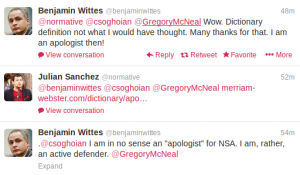The Scandal of Lying about “Thwarted” “Plots” Started 4 Years Ago
As predicted, one big takeaway from yesterday’s NSA hearing (the other being the obviously partial disclosure about location tracking) is Keith Alexander’s admission that rather than 54 “plots” “thwarted” in the US thanks to the dragnet, only one or maybe two were. Here are some examples.
But they’re missing this real scandal about the government’s lies about the central importance of Section 215.
That scandal started 4 years ago, when an example the FBI now admits had limited import played a critical role in the reauthorization of Section 215 without limits on the dragnet authority.
First, note that even while Leahy got Alexander to back off his “54 plots” claim, the General still tried to insist Section 215 had been critical in two plots, not just one.
SEN. LEAHY: Let’s go into that discussion, because both of you have raised concerns that the media reports about the government surveillance programs have been incomplete, inaccurate, misleading or some combination of that. But I’m worried that we’re still getting inaccurate and incomplete statements from the administration.
For example, we have heard over and over again the assertion that 54 terrorist plots were thwarted by the use of Section 215 and/or Section 702 authorities. That’s plainly wrong, but we still get it in letters to members of Congress; we get it in statements. These weren’t all plots, and they weren’t all thwarted. The American people are getting left with an inaccurate impression of the effectiveness of NSA programs.
Would you agree that the 54 cases that keep getting cited by the administration were not all plots, and out of the 54, only 13 had some nexus to the U.S. Would you agree with that, yes or no?
DIR. ALEXANDER: Yes.
SEN. LEAHY: OK. In our last hearing, Deputy Director Inglis’ testimony stated that there’s only really one example of a case where, but for the use of Section 215, bulk phone records collection, terrorist activity was stopped. Is Mr. Inglis right?
DIR. ALEXANDER: He’s right. I believe he said two, Chairman; I may have that wrong, but I think he said two, and I would like to point out that it could only have applied in 13 cases because of the 54 terrorist plots or events, only 13 occurred in the U.S. Business Record FISA was only used in (12 of them ?).
SEN. LEAHY: I understand that, but what I worry about is that some of these statements that all is — all is well, and we have these overstatements of what’s going on — we’re talking about massive, massive, massive collection. We’re told we have to do that to protect us, and then statistics are rolled out that are not accurate. It doesn’t help with the credibility here in the Congress; doesn’t help with the credibility with us, Chairman, and it doesn’t help with the credibility with the — with the country. [my emphasis]
Here’s the transcript at I Con the Record from the previous hearing, where Inglis in fact testified that Section 215 was only critical in the Basaaly Moalin case (which was not a plot against the US but rather funding to defeat a US backed invasion of Somalia).
MR. INGLIS: There is an example amongst those 13 that comes close to a but-for example and that’s the case of Basaaly Moalin.
That is, in fact, Inglis said it had been critical in just one “plot.”
After he did, FBI Deputy Director Sean Joyce piped in to note the phone dragnet also “played a role” by identifying a new phone number of a suspect we already knew about in the Najibullah Zazi case.
MR. JOYCE: I just want to relate to the homeland plots. So in Najibullah Zazi and the plot to bomb the New York subway system, Business Record 215 played a role; it identified specifically a number we did not previously know of a —
SEN. LEAHY: It was a — it was a critical role?
MR. JOYCE: What I’m saying — what it plays a —
SEN. LEAHY: (And was there ?) some undercover work that was — took place in there?
MR. JOYCE: Yes, there was some undercover work.
SEN. LEAHY: Yeah —
MR. JOYCE: What I’m saying is each tool plays a different role, Mr. Chairman. I’m not saying that it is the most important tool —
SEN. LEAHY: Wasn’t the FBI — wasn’t the FBI already aware of the individual in contact with Zazi?
MR. JOYCE: Yes, we were, but we were not aware of that specific telephone number, which NSA provided us. [my emphasis]
So, when pressed, Joyce admitted that Section 215 wasn’t critical to finding Adis Medunjanin, one of Zazi’s conspirators. (And if you read Matt Apuzzo and Adam Goldman’s Enemies Within, you see just how minor a role it played.)
That’s important, because the Administration’s use of Section 215 in the Zazi case was crucially important to the defeat of two efforts to rein in the dragnet in 2009.

